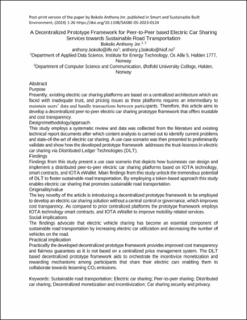| dc.contributor.author | Bokolo, Anthony Junior | |
| dc.date.accessioned | 2024-03-07T13:40:04Z | |
| dc.date.available | 2024-03-07T13:40:04Z | |
| dc.date.created | 2024-02-14T12:32:45Z | |
| dc.date.issued | 2024 | |
| dc.identifier.citation | Smart and Sustainable Built Environment. 2024. | en_US |
| dc.identifier.issn | 2046-6099 | |
| dc.identifier.uri | https://hdl.handle.net/11250/3121446 | |
| dc.description.abstract | Purpose Presently, existing electric car sharing platforms are based on a centralized architecture which are faced with inadequate trust, and pricing issues as these platforms requires an intermediary to maintain users’ data and handle transactions between participants. Therefore, this article aims to develop a decentralized peer-to-peer electric car sharing prototype framework that offers trustable and cost transparency. Design/methodology/approach This study employs a systematic review and data was collected from the literature and existing technical report documents after which content analysis is carried out to identify current problems and state-of-the-art of electric car sharing. A use case scenario was then presented to preliminarily validate and show how the developed prototype framework addresses the trust-lessness in electric car sharing via Distributed Ledger Technologies (DLT). Findings Findings from this study present a use case scenario that depicts how businesses can design and implement a distributed peer-to-peer electric car sharing platforms based on IOTA technology, smart contracts, and IOTA eWallet. Main findings from this study unlock the tremendous potential of DLT to foster sustainable road transportation. By employing a token-based approach this study enables electric car sharing that promotes sustainable road transportation. Originality/value The key novelty of the article is introducing a decentralized prototype framework to be employed to develop an electric car sharing solution without a central control or governance, which improves cost transparency. As compared to prior centralized platforms the prototype framework employs IOTA technology smart contracts, and IOTA eWallet to improve mobility related services. Social implications The findings advocate that electric vehicle sharing has become an essential component of sustainable road transportation by increasing electric car utilization and decreasing the number of vehicles on the road. Practical implication Practically the developed decentralized prototype framework provides improved cost transparency and fairness guarantees as it is not based on a centralized price management system. The DLT based decentralized prototype framework aids to orchestrate the incentivize monetization and rewarding mechanisms among participants that share their electric cars enabling them to collaborate towards lessening CO2 emissions. | en_US |
| dc.language.iso | eng | en_US |
| dc.publisher | Emerald | en_US |
| dc.subject | electric car sharing | en_US |
| dc.subject | peer-to-peer sharing | en_US |
| dc.subject | distributed car sharing | en_US |
| dc.subject | decentralized monetization and incentivization | en_US |
| dc.subject | car sharing security and privacy | en_US |
| dc.subject | sustainable road transportation | en_US |
| dc.title | A decentralized prototype framework for peer-to-peer based electric car sharing services towards sustainable road transportation | en_US |
| dc.type | Peer reviewed | en_US |
| dc.type | Journal article | en_US |
| dc.description.version | acceptedVersion | en_US |
| dc.rights.holder | © 2024, Emerald Publishing Limited | en_US |
| dc.subject.nsi | VDP::Teknologi: 500 | en_US |
| dc.source.journal | Smart and Sustainable Built Environment | en_US |
| dc.identifier.doi | 10.1108/SASBE-05-2023-0124 | |
| dc.identifier.cristin | 2245939 | |
| cristin.ispublished | true | |
| cristin.fulltext | postprint | |
| cristin.qualitycode | 1 | |
